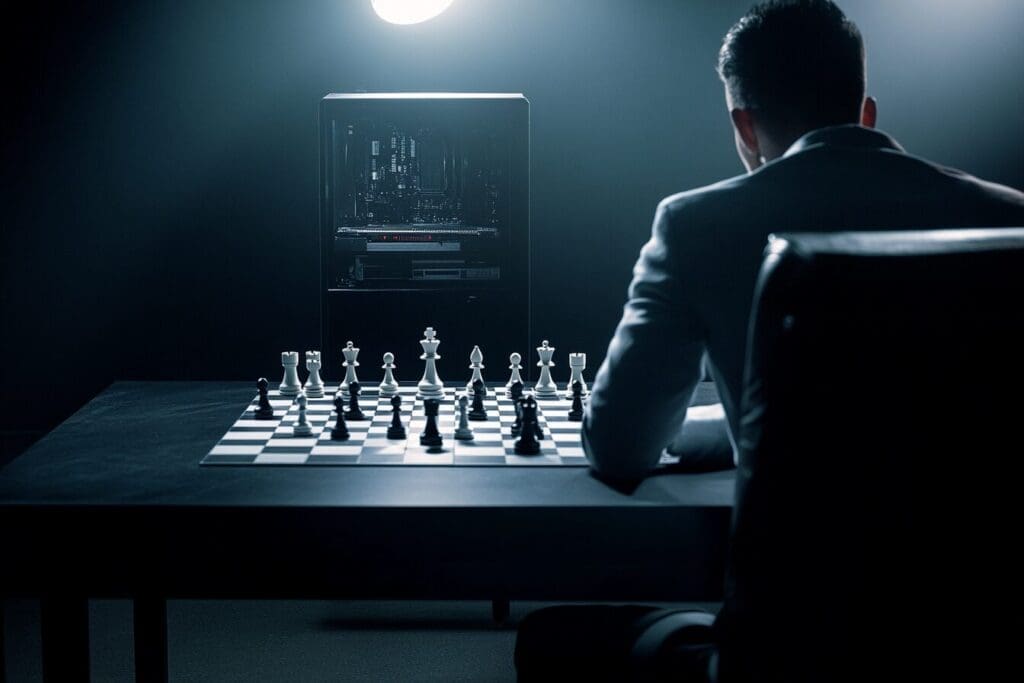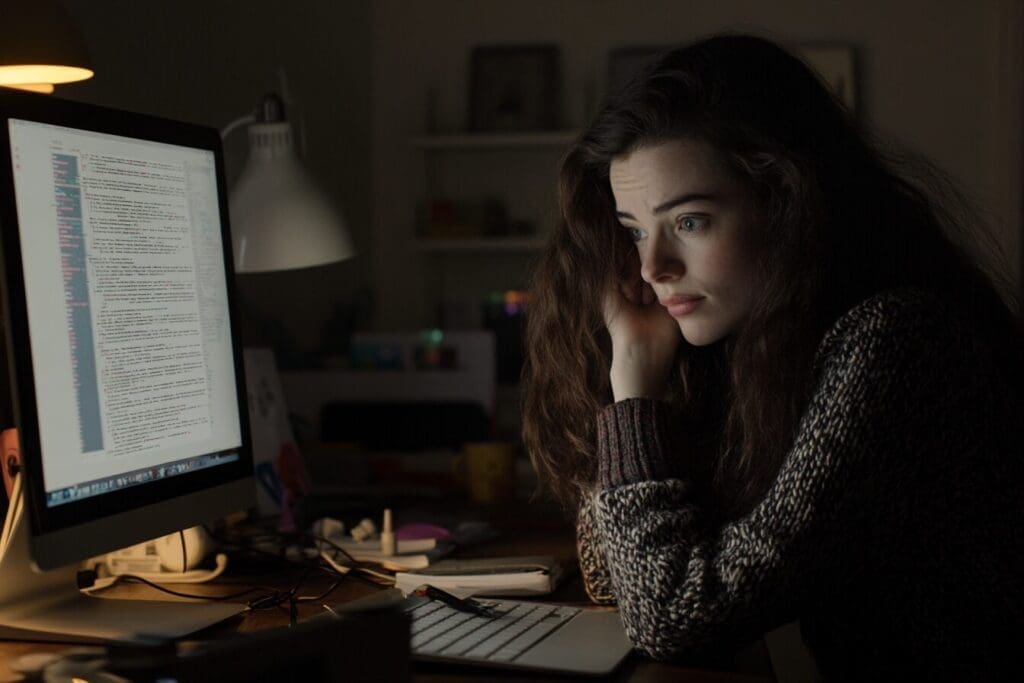Do you remember the moment Garry Kasparov lost to IBM’s Deep Blue? I do. I wasn’t a chess player myself, but I was fascinated. Here was one of the greatest human minds in strategy and logic—defeated by a machine. For many, it felt like a wake-up call. Was this the beginning of the end for human intelligence?

Since then, AI has been popping up in places we never expected. It’s not just playing games anymore. It’s writing code, generating art, suggesting your next favorite song, and even helping doctors make diagnoses. We’ve gone from being curious about what AI could do… to being surprised by what it already does.
But here’s what I keep asking myself: when AI does something better—or faster—than a human, does that mean we’ve lost something? Or are we just entering a new chapter in how we define expertise?
In this post, I want to take you on a little journey—from chessboards to code editors—to explore how AI is challenging what we thought made us special. Not to panic, not to glorify the machines, but to ask a more curious question: what happens when we stop seeing AI as a rival… and start seeing it as a partner?
Section 1: Chess—The Symbolic Battle (and Why It Matters)

Let’s go back to that match—Kasparov versus Deep Blue in 1997. It wasn’t just a news headline or a quirky tech story. It felt like a turning point. A moment when many people stopped and asked, Wait… can machines actually think?
What made that moment so powerful wasn’t just that a machine won a chess game. It was the idea that one of our most respected forms of human expertise—strategic thinking, pattern recognition, logical decision-making—had been challenged. For centuries, we’ve seen intelligence through a very human lens: the ability to reason, reflect, plan ahead, and adapt. And chess had often been used as a kind of measuring stick for that.
But Deep Blue didn’t “think” in the way we usually mean. It didn’t get nervous under pressure, or draw from life experience. It didn’t innovate mid-game or feel the weight of a global audience watching. It calculated—faster and deeper than any human could. It used raw computational power, scanning through millions of possible moves and outcomes in seconds.
That’s what made this such a wake-up call. Suddenly, speed and processing power were part of the definition of intelligence. And it forced us to start rethinking what expertise really meant. Was it about understanding—or about output? Was it about knowledge—or performance?
This wasn’t the end of human expertise, of course. But it was the beginning of a much more complicated conversation. One that we’re still having today.
Section 2: Beyond Chess—New Frontiers of AI Expertise
After the chess match, things didn’t change overnight. There was no robot uprising, no sudden collapse of human brilliance. But something subtle did happen: we started to shift how we define intelligence—and eventually, how we think about creativity, too.
In healthcare, AI became a kind of quiet partner. It didn’t replace doctors, but it began helping them see things faster—an extra layer of insight. In programming, AI tools started suggesting code, almost like a very eager assistant who never runs out of ideas. These weren’t flashy takeovers, but they were real, and they made us pause.

Because here’s the thing: until Deep Blue, we mostly equated intelligence with human qualities—reasoning, intuition, reflection. The match forced us to confront the idea that speed, scale, and pattern recognition might also be signs of intelligence… just not the kind we were used to.
And then AI started creeping into creative spaces.
At first, I’ll admit I wasn’t sure what to think. Can a machine be creative? Doesn’t creativity come from lived experience—emotion, culture, struggle? But over time, my perspective shifted. Not because I believe AI replaces creativity, but because I’ve seen how it can expand it.
I still believe creativity is deeply human, but I also believe it’s flexible. And AI—when used intentionally—can become part of that creative process. It can surprise us, provoke us, and even help us see things in new ways.
That chess match didn’t just teach us that machines can play games. It challenged us to rethink what we value in intelligence and what we protect as “human.” And maybe, just maybe, it nudged us toward a more generous, evolving definition of both.
Section 3: The Strengths of AI (and Why It Challenges Us)
I’ll be honest—there are times when AI amazes me. The speed, the scale, the way it can spot patterns in data that would take a human days—or maybe weeks—to uncover. It’s not emotional. It doesn’t get tired or second-guess itself. And when it works well, it works really well.
But I think that’s part of why it can feel a little uncomfortable.
We’re not used to being challenged like this—not by machines. And yet, here we are, watching AI complete tasks that we once considered uniquely human. It summarizes, translates, recommends, predicts. It’s fast, consistent, and, let’s be honest, sometimes frustratingly efficient.
And that’s when I start asking: what does that mean for us?

Not in a fearful, “robots are taking over” kind of way. But in a very real, human way. If AI can do the thing I was proud of doing, where does that leave me? What is my role now?
I don’t think the answer is to compete with the machine. That’s not a race we’re meant to win. Instead, I think this is a moment to reflect—to look at what we do that AI can’t.
Because yes, AI is good at facts and figures and formulas. But what about interpretation? Context? Emotional nuance? What about the ability to look at a messy, imperfect world and still find meaning?
AI pushes us—not just to work faster or smarter, but to get clearer about what makes our kind of intelligence… well, human.
What’s one thing you do in your daily life—not because it’s efficient, but because it’s meaningful?
That’s not just intelligence. That’s something no machine can truly replicate.
Section 4: Human Strengths—Where AI Still Struggles
Let’s be clear: for all its speed and processing power, AI still stumbles in areas that come naturally to us.

It doesn’t understand context the way we do. It doesn’t read the room, catch the subtext, or notice the hesitation in someone’s voice and pause to ask, “Are you okay?” It doesn’t draw from childhood memories, cultural nuance, or the kind of quiet wisdom you gain simply by living.
And empathy? That’s not something you can code.
We make decisions based on more than data. We bring in emotion, ethics, intuition. We notice contradictions and live with uncertainty. We’re not always efficient—but we are insightful. That’s the kind of intelligence that doesn’t fit into neat formulas or training sets.
And creativity? Real creativity? That messy mix of inspiration, emotion, and personal meaning—that’s still very much ours. Yes, AI can remix, combine, and surprise us with what it generates. But it doesn’t care. It doesn’t have something to say. We do.
It doesn’t celebrate, mourn, wonder, or worry. It doesn’t ask the big questions. But we do. And that matters.
That capacity for self-awareness, for emotional connection, for curiosity without clear answers—that’s where our intelligence becomes something richer. Something more than logic. Something human.
Section 5: Redefining Expertise—The Human-AI Partnership

Maybe the real question isn’t “Who’s better?”—AI or humans—but “What can we do together that we couldn’t do alone?”
Because what I’ve seen, again and again, is that the most exciting results don’t come from AI working in isolation—or humans trying to beat the machine. They come from collaboration. From recognizing what each side brings to the table.
In classrooms, AI can support teachers by offering personalized learning suggestions, while teachers bring the care and connection students need. In healthcare, AI can flag risks early, but it’s the doctor who understands the person behind the data. Even in creative work, AI can offer sparks, but the fire? That still comes from us.
This isn’t about giving up control—it’s about shifting perspective.
Maybe expertise doesn’t have to mean “knows the most” or “never makes mistakes.” Maybe it can mean being adaptable. Open. Willing to learn. Maybe the experts of the future aren’t the ones who compete with AI—but the ones who know how to work alongside it.
And maybe that’s not such a bad thing.
Conclusion
Back in 1997, when Kasparov lost that famous chess match, it felt like the start of something big. And it was. But not because a computer “won.” It was big because it challenged us to ask new questions—about intelligence, about expertise, and about what makes us human.
Since then, AI has moved into so many parts of our lives. Some of it is impressive. Some of it is unsettling. And some of it—if we’re honest—is still a bit confusing.
But instead of focusing on what AI might take away, maybe it’s more helpful to ask what it invites us to rethink. How can we use this technology to grow, adapt, and even create in new ways? What does it show us about our own strengths, and how we define knowledge, creativity, and meaning?
Because here’s the thing: we’re not out of the game. Not even close.
We’re just playing on a new kind of board.

What part of your intelligence—your way of thinking, feeling, creating—can’t be replicated by a machine?
Hold onto that thought, because next week, we’re shifting gears just a little.
We’ll explore how science fiction has shaped our expectations of AI—from wise-cracking androids to cold, calculating machines—and how those fantasies compare to the far more ordinary (and sometimes disappointing) tools we use today.
And of course, Sven will have his say next. He’s already sharpening his sarcasm for a follow-up post titled “AI vs. Humans: The Losing Streak Continues.” Let’s just say… he has thoughts. Especially about how we humans are “totally winning” this whole intelligence thing.
Let’s keep this conversation going:
🧠 What surprised you most about how AI challenges human expertise?
💬 Leave a comment and share your thoughts—or your favorite sci-fi AI that totally didn’t age well.
And if you enjoyed this post, consider subscribing so you don’t miss the next one!
